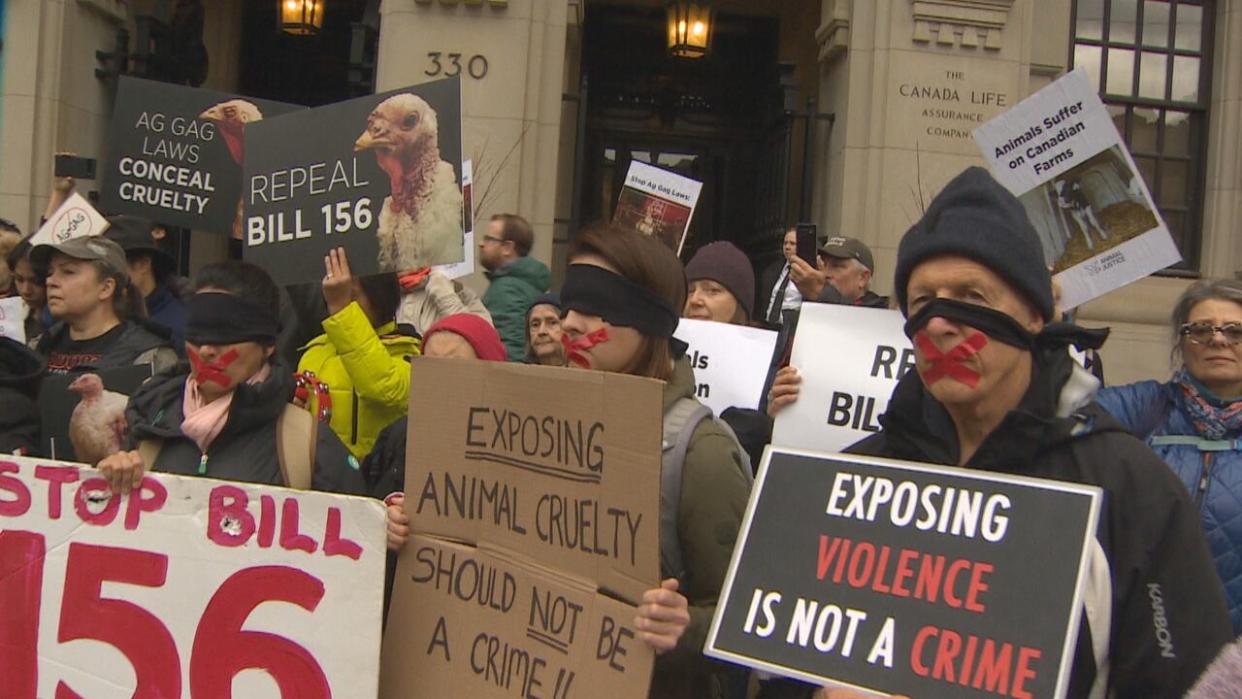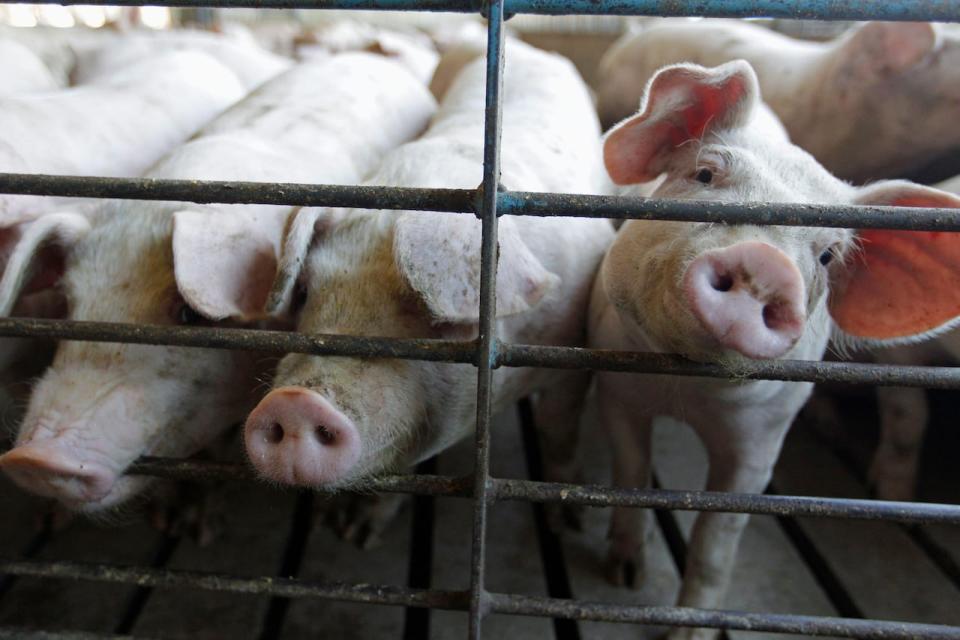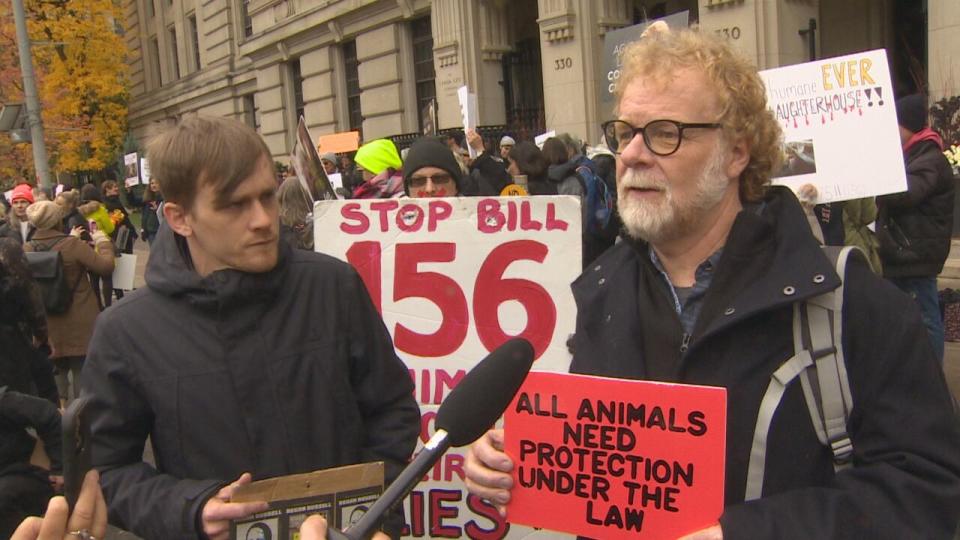Animal rights group takes Ontario to court over law preventing undercover farm investigations

An animal rights group argued in a Toronto courtroom on Monday that an Ontario law that bans undercover investigations of animal cruelty on farms should be declared unconstitutional.
Andrea Gonsalves, a lawyer for Animal Justice, a Canadian non-profit organization, said the law violates the Canadian Charter of Rights and Freedoms. Ontario's Security from Trespass and Protecting Food Safety Act, which took effect in 2020, bans animal advocates from going undercover to investigate animal cruelty at farms and slaughterhouses.
Dozens of people gathered outside the Superior Court of Justice on University Avenue on Monday, as the opening arguments of the case were being delivered, to draw attention to the law, the case and what they say are the dangers of agricultural gag laws.
Gonsalves told the court that the animal advocates would like the provisions of the act and the regulation that they are challenging to be declared of no force or effect under Section 52 of the Constitution Act.
"At the core of this case is the protection and upholding of the fundamental freedom of expression in the context where expressive activity is focused on the treatment and welfare of animals in our farming industry. This is a matter of profound concern to all Ontarians," Gonsalves told the court. "Where do the animals we consume come from and how are they treated?"
"In recent years, animal protection groups and individuals have used undercover investigations to expose to the public the grim, dark realities of animal suffering caused by abuse in agricultural facilities, in transport and in slaughter, and suffering caused by generally accepted practices that are standards in the industry," she continued.
Gonsalves added that the "exposes" that have come from such undercover investigations have proven beneficial for animals, the industry, those taking on risk trying to capture video of the incidents of abuse
"Same applies to those who bear witness by attending outside slaughterhouses to show compassion to the animals in their last moments. These exposes work, in other words," she said.
Law infringes on Charter rights, says advocate
Gonsalves said the work to obtain the undercover footage and the publication of the results is an exercise of rights under the Charter. She said the law infringes upon Charter-protected rights to free expression, to peaceful assembly and to be presumed innocent until proven guilty.
"This regime makes it illegal for animal rights advocates to gather the material to show the public what happens behind the closed doors, gates and fences of locations where farmed animals are raised, transported and slaughtered," she said.
She said, however, the case is not about night raids, violent protests or illegal occupations of farms. All of these activities were illegal before the act came into force, she said.

A view of hogs at a farm. Animal Justice, a non-profit organization, says an Ontario law enables agricultural facilities to cover up animal abuse. (M. Spencer Green/The Associated Press)
According to Animal Justice, the group is challenging the ban on going undercover at a farm to record cruelty with a hidden camera, due to a provision that makes it an offence to get a job at a farm under false pretences, and the restrictions on peaceful protests outside slaughterhouses, due to provision that bans interacting with animals in transport trucks.
Camille Labchuk, executive director of Animal Justice, said the law enables agricultural facilities to cover up animal abuse.
"It makes it illegal for an advocate, or a journalist to go undercover on a farm and expose hidden cruelty on hidden camera," she said.
"These types of exposes have resulted in charges and convictions against farms for illegal cruelty. They've exposed practices that the public finds unacceptable, like keeping animals caged in tiny crates, and like workers hitting or punching animals," she added.
"These exposes have tremendous value to the public and it should not be the case that you cannot expose this abuse."
According to Labchuk, members of Animal Justice had spearheaded a number of undercover animal cruelty investigations before the province passed the law.

Mark Powell, husband of Regan Russell, an animal rights activist who was fatally hit by a truck carrying a load of pigs in 2020, was at the protest. She died days after the law was passed. (Doug Husby/CBC)
Ontario government says law is constitutional
The Ontario government would not speak specifically about the case, saying it is before the courts.
But in a statement on Monday, Ontario's Ministry of the Attorney General said the province's position is that the law and its regulation are constitutional.
"The Legislation does not impede expression by activists, journalists, or anyone else, nor does it otherwise breach the Charter," the statement reads.
The court proceedings are expected to wrap up on Wednesday. Intervenors in the case, including Centre for Free Expression, Regan Russell Foundation, and Animal Alliance of Canada, are expected to speak on Tuesday.
Mark Powell, husband of Regan Russell, an animal rights activist who was fatally hit by a truck carrying a load of pigs in 2020, was at the protest. She died days after the law was passed.
Powell said his wife had to get onto private property many times to get evidence of animal abuse. He held a sign that she always carried that said: "All animals need protection under the law."
"That's how she got killed. She was standing up for what she believed in for over 40 years," he said.


